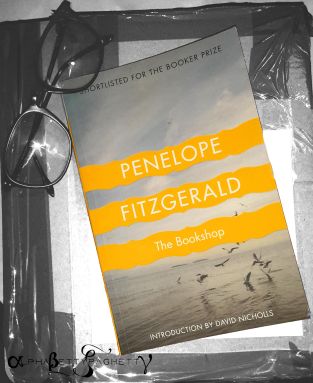The Bookshop
Penelope Fitzgerald

A short and utterly compelling novel that I read within the space of a few hours. I simply could not sleep until I reached the final page… and then wrote a review.
Florence Green has a simple desire to open a bookshop in her quiet Suffolk town of Harborough. There’s an old, damp, unwanted building, stood empty for years and Florence has the idea to repurpose it as The Old House Bookshop. The old farts and local council botherers don’t like change and decide to kick up a fuss.
Mrs Green is an astonishing woman. Not in any sensational sense of fame or great feats of strength or ability. Hers is a quiet courage, juxtaposed with moments of delightful bluntness that the majority of her peers find intolerably rude. “Her courage, after all, was only a determination to survive.”
Half-baked officials for the Something-Or-Other Committee periodically appear out of the damp woodwork, as the self-important Mrs Gamart engages in ruthless tactics, determined to see the shop fail. Mrs Gamart, a petty woman and chair of various local committees, “always acted in the way she felt to be right. She did not know that morality is seldom a safe guide for human conduct.”
Some of my favourite moments in the book are the correspondence Florence is obliged to enter into it with the various officials that pop up. Letters filled with verbal parrying and barely concealed contempt are quintessentially British and delightful to read. When Florence’s decision to market a certain “unduly sensational novel” – Lolita by Vladimir Nabakov – gets a surprising amount of local attention, a certain prominent member of society sees fit to seek legal representation:
December 4 1959
Dear Mrs Green,
I am in receipt of a letter from John Drury & Co, representing their client Mrs Violet Gamart of The Stead, to the effect that your current window display is attracting so much undesirable attention from potential and actual customers that it is providing a temporary obstruction … and that she, as a Justice of the Peace and Chairwoman of numerous committees (list enclosed herewith) has to carry out her shopping expeditiously.
After much back and forth, Florence exhausts the pretence of polite correspondence and brings it to a close rather succinctly:
December 11 1959
Dear Mr Thornton,
Coward!
Yours sincerely,
Florence Green.
The descriptions of small town society and their petty commander-in-chief made me laugh out loud. While scenes shared with her ten-year-old assistant, Christine, and aging neighbour, Mr Brundish, are peaceable moments that deflate the barriers of age and status. The misanthropic Mr Brundish and the terse ten-year-old are her closest companions and biggest supporters of her bookshop. Neither of them are great talkers and Florence is fine with that. Moments of silence are used to great effect throughout the novel, demonstrating the ease with which mutual understanding can be found between kindred spirits without need for words.
Florence is quietest when among friends, while she is at her most effluent, ready with a quip, when confronted with her opposers, her letters being great examples of this. The silence also allows for the presence of the mysterious ghost that resides in the Old House, referred to as “the rapper”, as well as the absence of her husband, whose death is only briefly alluded to. Altogether creating a sense of lonliness to the novel, but it is not a self-indulgent or overwhelming. The silence, the lonliness, is an accepted part of her existence, and becomes a thing to be shared with her chosen companions.
“Lonliness was speaking to lonliness.”
The most touching stories are the ones that don’t try to be so. A Whole Life, The Book Thief, The Unlikely Pilgrimage of Harold Fry. These titles are treasures because of their quality of being uncomplicated and reserved; their pages gently exude warmth and compassion with honest emotion, eschewing the kind of melodrama and tragedy that some authors pump into their chapters, determined that we should burst from the pressure of it all. No, the stories that stay in my heart, in my stomach, are the ones that creep up on me with their unassuming tones and humble offerings. To this list of pearls within oysters, I now add “The Bookshop”.
“A good book is the precious life-blood of a masterspirit, embalmed and treasured up on purpose to a life beyond life, and as such must be a necessary commodity.”

Oh, I’m glad to hear you enjoyed it that much! It’s on my TBR as well:)
LikeLiked by 1 person
Pingback: Book Review: “The Music Shop” by Rachel Joyce | Alphabetty Spaghetty